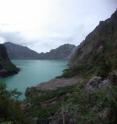Guam researcher studies Mount Pinatubo ecosystem recovery
University of Guam ecologist Thomas Marler recently mobilized efforts to characterize the vegetation that has recovered following the eruption of Mount Pinatubo, Philippines. "My interest was sparked by the paradox that this volcano's cataclysmic 1991 eruption was so powerful it changed global climate, yet after a full 15 years the biology of the recovering ecosystem had not been studied," said Marler. The void of research motivated the Guam ecologist to spend a majority of 2006 conducting botanical surveys on the mountain. Marler then teamed up with University of Washington ecologist Roger del Moral to publish results from the surveys in a recent issue of the journal Pacific Science.
This facet of ecology is termed "primary succession" and refers to how organisms begin to grow in sterile habitats, then how they form communities. One core theme that emerged from Marler's research was that unstable soil surfaces of Mount Pinatubo continue to re-start the succession of community formation. "The situation on this mountain serves to remind us that recovery from the damage inflicted by hurtful events may linger for many years," said Marler. A life lesson that Marler contends has application to human relations.
The pair of ecologists also identified several explanatory factors that have correlations with the current status of primary succession. Elevation and the distance to permanent human settlement were two major factors that emerged to explain the vegetation characteristics. According to Marler, there is no solidarity among ecologists about a set of universal factors that enable detailed prediction during succession. The Pinatubo research adds to the list of case studies that may eventually allow the formation of clarity among various succession models.
A scientist with the Western Pacific Tropical Research Center (WPTRC), Marler's research in the Philippines will increase global understanding of ecosystem recovery following natural disasters. "This important research is an example of the critical role that the University of Guam plays while fulfilling our mission in the region," said Greg Wiecko, Associate Director of the WPTRC. "A critical void in knowledge was identified and the University's expertise and resources were deployed to fill the void."
Source: University of Guam
Other sources
- Guam researcher studies Mount Pinatubo ecosystem recovery: Primary succession on the slopesfrom Science DailyMon, 8 Aug 2011, 18:30:34 UTC
- Guam researcher studies Mount Pinatubo ecosystem recoveryfrom PhysorgMon, 8 Aug 2011, 14:00:40 UTC
